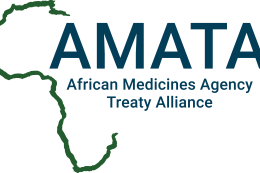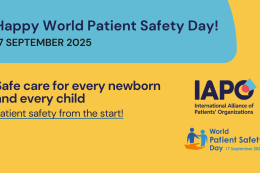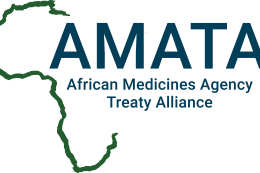Joint Statement on World Antimicrobial Awareness Week

Published on: 18 November 2020
18-24 November 2020
World Antimicrobial Awareness Week (WAAW) aims to increase awareness of global antimicrobial resistance (AMR) and to encourage best practices among the general public, health workers and policy makers to avoid the further emergence and spread of drug-resistant infections.The International Society for Quality in Health Care (ISQua), the International Hospital Federation (IHF), the International Alliance of Patients’ Organizations (IAPO) and the International Federation of Pharmaceutical Manufacturers and Associations (IFPMA) support the Tripartite Organizations (the Food and Agriculture Organization of the United Nations (FAO), the World Organisation for Animal Health (OIE) and WHO) agreed slogan for 2020 “Antimicrobials: handle with care” and the theme for the human health sector for WAAW 2020 “United to preserve antimicrobials“.
ISQua, IHF, IAPO and IFPMA are committed to improving people safety and healthcare quality worldwide, this includes raising awareness of global antimicrobial resistance (AMR), promoting antibiotic stewardship and calling for appropriate conditions to attract investments in research and development to ensure that a sufficient pipeline of antibiotics is available at any time to treat common and rare infections.
“One of the pressing challenges we face in healthcare is the inappropriate use of antibiotics. As we face the challenges of COVID we need to remember that overprescribing of antibiotics is causing the problem of resistance. Healthcare workers need a sustainable antimicrobial stewardship process built on a sound foundation of continual improvement to ensure we can face a future with all we need to overcome infections. ISQua has included Antimicrobial Stewardship as one of the key modules in our medication safety certificate as we move to provide the knowledge to make a difference”, states ISQua’s CEO, Dr Peter Lachman.
According to the IHF CEO, Eric de Roodenbeke, “antimicrobial resistance is underscoring the limitation of health services in their fight against diseases: if research will help to find new alternatives to fight infections it is also necessary to better act on the food chain and to keep environment safe from antibiotics waste. We are at a crossroad requesting a decisive move on the combined health and environment agenda”.
“We should not forget that antibiotics remain a revolutionary discovery of the modern medicine. At the same time, we need to remind ourselves that we have not inherited the antibiotics from our ancestors – but have borrowed them from the future generations. But today, there are still parts in the world where antibiotic misuse is a rule and not an exception. As patients, we are obliged to take the responsibility and effective action across all fronts and to take one now. To involve every patient and citizen and make antimicrobial resistance everybody’s business. A safer world should be our commitment and legacy to the future generations.” states IAPO’s CEO, Kawaldip Sehmi.
“In addition to good stewardship there is an urgent need to build a robust pipeline of new product to protect society from emerging resistance to current antibiotics,” states Thomas Cueni, Director General of the International Federation of Pharmaceutical Manufacturers and Associations. “We can’t let antibiotic development collapse, so the biopharmaceutical industry has launched the $1bn AMR Action Fund to support biotech companies bring 2 to 4 new antibiotics to patients by 2030. The Fund is not a sustainable solution and so we call on governments to enact market-based reimbursement and access reforms, including new pull incentives, to drive sustainable investments in antibiotic R&D.”
We expect these messages to be relayed by the power of our networks in order to turn best practices into concrete action on the ground.
The complex social, scientific, and economic issues driving AMR cannot be resolved without strong collaboration between the private and public sectors. Protecting patients and counteracting a public health crisis, which can potentially undermine entire health systems, requires a coordinated global response by all stakeholders, including governments, civil society, academia, international health agencies, health care providers, and the life sciences industry.
About the International Society for Quality in Health Care (ISQua)
The International Society for Quality in Health Care (ISQua) is a member-based, not-for-profit community that delivers a variety of initiatives and programmes. Our mission is to inspire and driveimprovement in health, and the safety and quality of healthcare worldwide. Being a member gives you access to ISQua’s global community, exclusive website content, discounts to our conferences, access to the International Journal for Quality in Health Care, exclusive access to industry experts and much more. Find out more at https://isqua.org/.
About the International Hospital Federation (IHF)Established in 1929, the IHF is an international not for profit, non-governmental membership organization representing thousands of hospitals worldwide. IHF recognizes the essential role of hospitals and health care organizations in providing health care, supporting health services and offering education. Its role is to enable members’ exchange of knowledge, strategies, and experience with the primary goal of improving the health of society. Find out more at www.ihf-fih.org.
About the International Alliance of Patients’ Organizations (IAPO)Established in 1999, IAPO is a unique global alliance representing 300 patient organisations from 71 countries working in all disease areas, with a vision to see patients throughout the world at the centre of healthcare that is safe, accessible and affordable. IAPO is in official relations with the World Health Organisation, contributing to the commitments for patient safety and universal health coverage, leaving no one behind. Find out more at www.iapo.org.uk.
About the International Federation of Pharmaceutical Manufacturers and Associations (IFPMA)IFPMA represents research-based pharmaceutical companies and associations across the globe. The research-based pharmaceutical industry’s 2 million employees research, develop and provide medicines and vaccines that improve the life of patients worldwide. Based in Geneva, IFPMA has official relations with the United Nations and contributes industry expertise to help the global health community find solutions that improve global health.
Downloads



